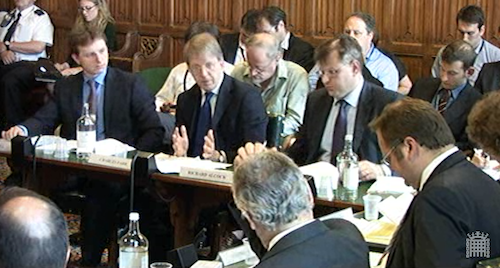This article is more than 1 year old
UK.gov: You didn't trust us with your ID, so we gave it to private biz
But the very next day, it gave it away
2012 review Earlier this year your correspondent was standing tantalisingly close to Matt Smith in the ACTUAL TARDIS - long story, not gonna Facebook it, never gonna tweet it. However, many Brits are happy to noisily ricochet chunks of their private lives across any number of websites and systems, in a year in which the British government has pushed for sweeping online surveillance powers.
The end result of our government's desire to catch these flying bits and bytes of our lives could be more internet-bothering laws. Perhaps the defining moment of this year's campaign was Home Secretary Theresa May's resurrection of NuLabour's shelved Interception Modernisation Programme as the not-exactly-catchy-sounding Communications Capabilities Development Programme. In opposition, the Tories had deeply opposed any such grand snooping plans and argued that civil liberties would be eroded by Labour's National ID-obsessed database state.
But now that the Conservative Party is the senior partner in the ruling coalition, the mood has changed: May was accused of pandering to the needs and desires of MI5, while many of her Cabinet colleagues continued to toil away at their own pet projects involving the online world.
May has pushed - at times incoherently - for surveillance of the internet by spooks and police to be massively beefed up in the UK while being careful to insist that no "central database" would be built. Instead, the Home Sec wants to transfer the burden of storing such sensitive data onto ISPs, who under the proposed law would be required to retain subscriber information, usage and traffic data for 12 months.
Indeed, much of this offloading of data-hoarding responsibility to the private sector has been in play for some time now - even as junior coalition partner the Liberal Democrats watched from the sidelines chewing on their lips before occasionally wading in with a suggestion that "we perhaps need to rethink that one".
Deputy Prime Minister Nick Clegg certainly showed his mettle by forcing May to introduce a draft communications data bill so it could be appropriately prodded at by MPs and peers. That climbdown happened and, after many months of trying to untangle the planned legislative overhaul, the Home Affairs Select Committee concluded that the bill - in its current form - was "too sweeping", "misleading" and "suspicious".
In response, Clegg said the Home Sec needed to go back to the drawing board. May kind of agreed, but said she'll be back fighting fit in 2013 ready to wipe the floor with her critics who oppose her beloved web snooping bill that will apparently eradicate terrorism and pedophilia.
Her department, steered on this issue by Director of the Office for Security and Counter Terrorism Charles Farr, now has to discuss properly with internet players about the technical aspects and the "fanciful" £1.8bn 10-year cost figures of the bill.
It means that pushing such a law through this Parliament - which ends in 2015 - has hit something of a roadblock. That said, the committee of MPs and peers who examined the proposed law all recognised that legislation is needed as long as it is measured and proportionate.

Charles Farr (centre) made a rare public appearance at a select committee hearing in 2012
Microsoft and Google were among the tech giants quizzed by the panel, which is chaired by Lord Blencathra. Their evidence submitted to the committee underlined the frustration expressed privately to your correspondent about how little the industry was involved in working out how the proposed network-snooping law would work, if at all.
Microsoft's EU policy wonk Stephen Collins said he failed to get many answers out of the Home Office, while Google's UK public policy boss Sarah Hunter said the search giant was unable to even consult with May's department ahead of a closed committee hearing on 6 September.
Collins had told the committee that it appeared that spooks were clueless on the types of data they needed access to. He said:
[F]or me there is a danger that we are trying to address a capability gap when there is a lack of capability of understanding among law enforcement agencies of 21st century technologies and the data sets that are generated and how they can be accessed and used for investigations... I do not know what the solution is to bridge that capability gap, but it is like a sledgehammer to crack a nut to try to introduce primary legislation on the basis of a supposed information gap that really does not exist.
The draft bill called on ISPs to retain communications data by logging every website visit, as well as any access made by its customers to email accounts, Facebook and difficult-to-tap tech such as peer-to-peer communications and Skype. However, Hunter warned the committee of how “complex” and “expensive” the securing of user data on a massive scale would be.
She said:
Our company runs search, and in engineering terms it genuinely is rocket science. So the more you protect, the more you require a communication service provider to store, the more you have to be able to search through it. That is very difficult. At Google, we employ, I think, 250 engineers just to protect data overlaps. This is not something that should be taken lightly.
Had May's proposed law passed through the Lords and Commons unchallenged, then one of the biggest areas of concern would have been how access to such data might have been controlled. The UK government has a long and poor record on data protection, which underlines only too well the fallibility of civil servants and police officers who are required to protect and safeguard sensitive information they retain and process. But they don't always manage to, especially when staffing numbers are short and resources are squeezed.
